

FOCUS
T“It
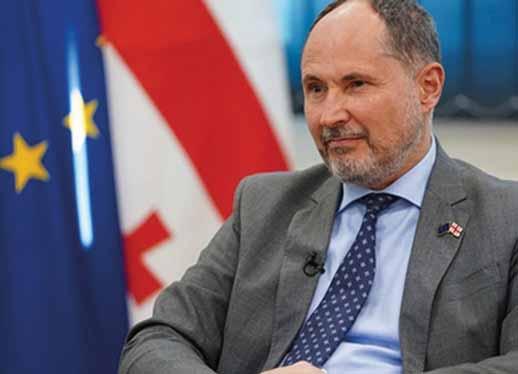
this week’s
Georgian Wine Showcased at La Grande Dégustation de Montréal Festival
COP30 in the Amazon: Climate Action, Food Systems, and the Pressure to Deliver
3
“This might be Ukraine’s worst winter yet” – War Correspondent Neil Hauer on the Evolving Front Lines, Morale, and the Battle for Pokrovsk
4
Illegal Logging Bust in Tianeti Highlights Georgia’s Ongoing Forest Protection Efforts
8
Fifty and Fearless: Valerian Shiukashvili Rewrites the Rules of Classicism in Tbilisi
Memory as a Stage: The Gabriadze Theater’s New Mediations on Humanity and Remembrance


Presidents Jinping, Putin and Trump. Source: Nikkei/Reuters/Getty Images/Yusuke Hinata

Georgian Wine Showcased at La Grande Dégustation de Montréal Festival
BY MARIAM RAZMADZE
Organized by the National Wine Agency of Georgia and supported by the Georgian Embassy in Canada, Georgian wines were prominently featured at La Grande Dégustation de Montréal, one of the most prestigious wine and spirits festivals in the city.
Now in its 15th year, La Grande Dégustation de Montréal is considered one of the largest events in the Quebec region, attracting nearly 10,000 visitors annually. The festival brings together wine professionals, journalists, writers and importers from around the world. This year’s event included wines from Canada, France, Italy, Spain, Austria, Greece, Romania and other countries. Attendees had the opportunity to taste nine varieties of Georgian wine, all of
which are already available in the Quebec and Ontario markets. The wines drew significant interest from visitors, highlighting growing international recognition and the increasing popularity of Georgian wine. Salome Kurasbediani, Chargé d’Affaires of Georgia in Canada, along with other embassy representatives, attended the festival.
Georgian wine exports to Canada have shown stable annual growth in recent years. In 2024, nearly 200,000 liters of Georgian wine were exported, representing a 16% increase compared to the previous year. Revenue from these exports reached USD 1.1 million, a 35% growth from 2023. The upward trend continued in 2025, with 10-month data showing 193,000 liters exported, an increase of 19% compared to the same period last year and export revenue reaching GEL 1.2 million, a 32% rise from 2024.
The National Wine Agency of Georgia provided the information.
Turkish Military Aircraft Crashes in Georgia, 20 Dead
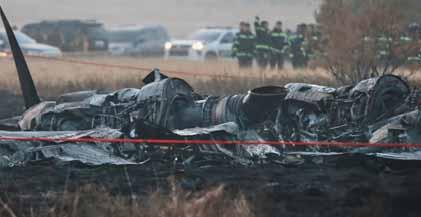
ATurkish C-130 military aircraft crashed in Georgia’s Sighnaghi Municipality, approximately five kilometers from the Azerbaijani border, on November 11, kiling all 20 personnel on board. The plane, reportedly flying from Azerbaijan to Turkey, disappeared from radar shortly after entering Georgian airspace.
The Georgian Ministry of Internal Affairs (MIA) confirmed that an investigation has been launched under Article 275, Part 4 of the Criminal Code, which addresses violations of air transport safety or operational rules resulting in loss of life. The ministry emphasized that further details will be released as the investigation progresses.
According to Sakaeronavigatsia, Georgia’s air navigation agency, the Aviation Search and Rescue Coordination Center was alerted via the national emergency number, 112. The aircraft vanished from
IWAG Brings Back the Winter Fair, Rekindling Tradition and Giving in Tbilisi

BY KATIE RUTH DAVIES
The International Women’s Association of Georgia (IWAG) is bringing back a much-anticipated seasonal tradition: the annual Winter Fair.
Set to return on November 29 at the Sheraton Grand Tbilisi Metechi Palace, 20 Telavi St., Tbilisi, the Winter Fair has long been a fixture in Tbilisi’s late-autumn calendar. Since the organization was founded in 1996 by a group of expatriate and Georgian women, IWAG has grown its dual mission of welcoming newcomers and supporting grassroots charitable work.
Over the years, the Winter Fair has evolved from a small artisan market into IWAG’s largest annual fundraising event. The fair welcomes several thousand visitors each year, and features more than 200 art, craft and food vendors and embassy stands offering gifts, food, and
international specialties from their home countries that are otherwise not available in Georgia. Funds raised, typically between 130,000 and 140,000 GEL, are directed entirely to IWAG’s charitable projects supporting women, children, the elderly, and other vulnerable groups across Georgia.
As has become tradition, the Sheraton transforms for the fair, with the local craftspeople and artisans, participating embassies and international vendors gathering under one festively decorated roof.
The Winter Fair was not held in 2024, with IWAG announcing its cancellation in October of that year. Describing the decision as difficult, the team expressed concern for the many beneficiaries who would feel its impact. The announcement came in parallel to society-wide discussions about Georgia’s newly introduced “foreign agent” law, which some observers say may have played a role in IWAG's decision.
This year’s Winter Fair therefore carries added significance, not only as a
return to form, but as a reaffirmation of the work that goes into each event. Behind it lies months of organization to bring it together — the planning, sponsorship, volunteer coordination and partnership with diplomatic and local communities; things that often go unseen, but which are central to the fair’s success.
The day itself is far more than a simple pre-holiday chance to shop and soak up the festive spirit: it is a means for IWAG to maintain its charitable impact: to be able to gift aid quickly to individuals with medical emergencies, or to newly founded organizations; a chance to support local business vendors, and to maintain an active role in the Tbilisi and wider Georgia community.
The Winter Fair is back, bringing both tradition and renewal—of fundraising, community, and the connections many have come to rely on. Join in the excitement: volunteer to help, or simply show up on the day and explore the stalls to find unique gifts and seasonal treats to make this Christmas and New Year extra special for you and your loved ones.
Ambassador Herczynski: EU Enlargement Report is the Last Wake-up Call for Georgia to Return to the European Path
Continued from page 1
“THE LAST WAKE-UP CALL”
The Ambassador reminded that the June 2024 European Council conclusion served as the first warning after the Georgian Parliament adopted the Law on Transparency of Foreign Influence, widely referred to as the “foreign agents” law.
Herczynski emphasized that the latest enlargement report, published last week, delivered an even stronger message to Tbilisi, describing it as “probably the final wake-up call” for the country’s EU aspirations.
radar without transmitting an alarm signal, prompting immediate dispatch of search and rescue teams to the presumed crash site. Authorities in Azerbaijan, the aircraft’s departure country, and Turkey were promptly informed. Turkey’s Ministry of Defence quickly confirmed that one of its military aircraft had crashed on Georgian territory.
Georgia’s Interior Minister, Gega Geladze, stated Thursday: “The bodies of all 20 crew members have been recovered. Forensic specialists and investigators continue their work at the site. All technical equipment and aircraft fragments relevant to the case have been examined, and expert analysis is in progress. More than a thousand individuals took part in the rescue and investigation efforts, including representatives from both Georgia and Turkey.”
The exact circumstances of the crash, including the cause, type of aircraft, and identities of the victims, have not been officially disclosed. Authorities from Georgia and Turkey continue to collaborate at the site as part of the ongoing investigation.
“In spring 2024, we said loud and clear: please do not adopt the foreign agents legislation, because this will have consequences. And in fact, in June 2024, as a result of its adoption, the European Council decided to de facto hold Georgia’s accession process, asking the authorities to reverse the course,” he noted.
“The June 2024 European Council conclusion was the first wake-up call. Last week, we had the final, probably the final wake-up call, in the form of the enlargement report, which was devastating for Georgia’s aspirations to join the European Union,” the Ambassador said.
CALL FOR URGENT ACTION
Herczynski expressed hope that Georgian lawmakers would act swiftly to realign the country with its European commitments.
“I sincerely hope that it will take less than 18 months for Georgian parliamentarians to learn and take action. Because if Georgia and the Georgian authorities are serious about ever joining the European Union, they urgently need to reverse the course and go back to the EU integration track,” he concluded.
The European Commission’s 2025 enlargement report, released on November 4, stated that Georgia has “de facto halted its pre-accession process” and referred to the country as a “candidate in name only.” The report urged the government to reverse democratic backsliding and make tangible progress on reforms aligned with EU values and principles.
UN Women and Partners Meet Rural Women Leaders in Georgia
BY MARIAM RAZMADZE
N Women, together with Bergljot Hovland, Ambassador of Norway, Ahmed Ebrahim Ahmed Taher Alnuaimi, Ambassador of the United Arab Emirates, and representatives from ProCredit Bank and the TASO Foundation, met with rural women from Racha-Lechkhumi, Samegrelo, Guria (Chokhatauri) and Imereti in Kutaisi. These women are members of Self-Help Groups driving positive change in their communities.
The meeting pointed to the progress of initiatives to economically empower rural women. Participants shared inspir-
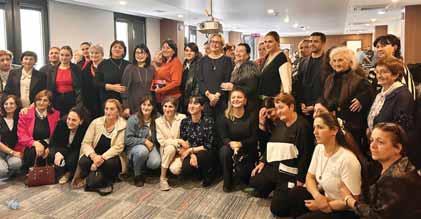
At La Grande Dégustation de Montréal Festival. Source: 1TV
At the 2023 Winter Fair. Source: IWAG
BY TEAM GT
The crash site. Source: aviationbusinessme
COP30 in the Amazon: Climate Action, Food Systems, and the Pressure to Deliver
BY KATIE RUTH DAVIES
In the sweltering heat of the Amazon, delegates arriving at the 30th session of the COP30 climate summit this week sensed more than the humidity: they felt urgency. “It’s no longer time for negotiations. It’s time for implementation, implementation and implementation,” declared António Guterres, Secretary-General of the United Nations. He warned that current national targets are likely to lead to roughly 2.3 °C of warming, well beyond the 1.5 °C threshold agreed in the Paris Accord. “Every fraction of a degree means more hunger, displacement and loss, especially for those least responsible,” he added. Brazil, which is hosting the summit this year, has cast COP30 as the “COP of truth.” President Luiz Inácio Lula da Silva told world leaders bluntly: “Without a complete picture of the Nationally Determined Contributions, we will walk blindfolded toward the abyss.” The message: no more vague promises — instead, tangible plans, finance and accountability.
GEORGIA’S QUIET BUT IMPORTANT ROLE
While not among the biggest emitters, the South Caucasus country of Georgia seeks to show it belongs in this global conversation. Ambassador Zurab Mchedlishvili joined the preparatory Pre-COP meeting in Brasília in October to emphasize Georgia’s commitment to climate cooperation and domestic action. Prime Minister Irakli Kobakhidze has previously stated, “In Georgia, we take
our responsibility to address the climate crisis seriously, and have already undertaken significant steps to make a meaningful impact.”
For Georgia and other mid-sized and smaller nations, COP30 offers a vital chance to align national policies with global demands, access climate-finance tools, and ensure the transition to clean energy is fair and inclusive.
COP30
HAS ITS WORK CUT OUT
Delegates face urgent challenges. They must accelerate plans to phase out fossil fuels, scale up renewable energy, and improve energy efficiency. Climate adaptation, especially for vulnerable communities, cannot be an afterthought. The host presidency’s message is clear: “As the age of warnings gives way to the age of consequences, humanity confronts a profound truth: climate adaptation is no longer a choice that follows mitigation; it is the first half of our survival. … Adaptation has demanded the courage to let go of what no longer serves us while preserving what defines us.”
THE EVER-UNTOUCHABLE TOPIC: FOOD, FARMING & ANIMAL AGRICULTURE
Beyond fossil fuels and forests, one subject has quietly surged into focus once again: the climate impact of animal agriculture. According to industry data, livestock systems are responsible for 32% of human-caused methane emissions, a potent greenhouse gas, and the sector is a major driver of deforestation, especially in the Amazon.
Activists at COP30 are demanding that the global conversation finally pay full
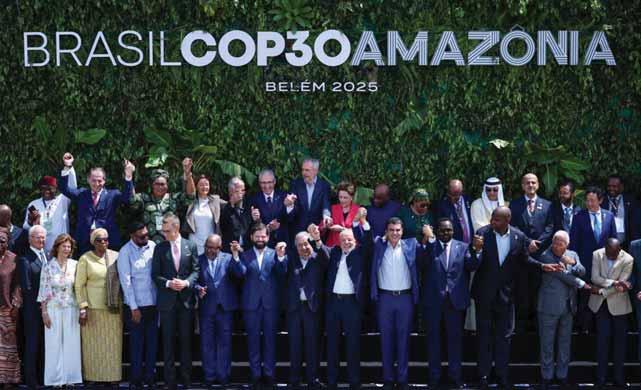
attention to this “cow in the room.” At the AgriZone pavilion, campaigners from World Animal Protection denounced “industrial animal agriculture” as a top driver of emissions and deforestation, and called out the irony of livestock-industry-backed exhibits at a climate summit.
“It is deeply concerning to see a third zone popping up at COP30 dedicated entirely to agribusiness interests,” they said. Every year, such environmental groups
ask that the summit’s own catering not serve animal-products — a symbolic gesture, they argue, reflecting the gravity of the animal-agriculture climate footprint. Their message: if governments are serious about 1.5 °C, they must also be serious about food systems.
In the Amazon, where the climate crisis is already visible, all eyes are on COP30. Will it deliver more than speeches? Will it finally address the often-overlooked impact of our food
systems, including the greenhouse-gas footprint of meat, dairy, and the crops grown to feed livestock? And beyond food, will it confront the full spectrum of climate challenges — fossil-fuel dependence, energy inequality, deforestation, and adaptation for vulnerable communities? For Georgia and dozens of other nations alike, the question is the same: are we moving from promises to action, or back to square one? The world is watching.

Brazil's President Luiz Inacio Lula da Silva, United Nations Secretary-General Antonio Guterres and other delegates at COP30 in Belem, Brazil, 7 November 2025. Source: REUTERS - Adriano Machado
“This might be Ukraine’s worst winter yet” – War Correspondent Neil Hauer on the Evolving Front Lines, Morale, and the Battle for Pokrovsk
INTERVIEW BY VAZHA TAVBERIDZE
This might be Ukraine’s worst winter yet, - warns Neil Hauer, a field correspondent recently returned from Ukraine’s front lines. In this interview with RFE/RL’s Georgian Service, Hauer describes how the war has transformed into small-unit, dronedominated combat — and how the “front line” itself has dissolved into a deep, chaotic combat zone. He discusses morale and manpower strains, the battle for Pokrovsk, and why Russia’s updated strike tactics could make this winter the hardest since 2014.
YOU'VE RECENTLY RETURNED FROM UKRAINE. WHAT'S THE SITUATION ON THE FRONT LINES?
The situation on the front line is shockingly different from how it was two years ago. In terms of combat, it’s almost unrecognizable. Whereas before, in the first two years or so of the war, it resembled a conventional conflict, with tanks, artillery, aircraft, armored vehicles, and the like, now it has shifted to a war fought by very small unit formations.
Soldiers are literally operating in pairs or groups of three at most, using motorbikes for mobility more than anything else. In most cases, they can’t bring armored vehicles within 10 or 15 kilometers of the front lines without being absolutely pummeled by FPV (firstperson-view) drones. Drones are everywhere, dominating the battlefield.
So the war has gone from one defined by heavy armor and Russian artillery superiority to one dominated by small arms and drones — men and machines as the two major components.
ONE UKRAINIAN OFFICER YOU SPOKE TO SAID, “THERE IS NOTHING RESEMBLING A FRONT LINE ANYMORE.” WHAT DOES THAT MEAN IN PRACTICE?
Yes, absolutely. Since you can’t have more than three or four guys in one position without it becoming an immediate target for drones and being destroyed, the battlefield is now composed of very small, isolated outposts spread along the front.
The other key factor is Russia’s evolving strategy. In many cases, Russian forces don’t try to engage and destroy every Ukrainian position. Instead, they simply bypass them — often literally charging past on motorbikes. During these assaults, they take enormous cas-
ualties, sometimes 90 to 95 percent losses. But even if just a few soldiers make it through, they’ll reach a position behind the Ukrainian lines, dig in, get resupplied by drones, and wait for reinforcements to arrive. From there, they push further.
As a result, the front line now looks like a series of dots — scattered Russian and Ukrainian positions spread over several kilometers. The “front line” has effectively become a front zone, five kilometers deep. In some areas, the Russians are ahead; in others, the Ukrainians are past them. It’s messy, overlapping, and constantly shifting.
SO AS A UKRAINIAN SOLDIER, YOU MIGHT BE DEFENDING THE FRONT LINE — AND STILL HAVE THE ENEMY BEHIND YOUR BACK?
Yes, absolutely. That happens very, very often.
WHAT’S THE MOOD AMONG UKRAINIAN TROOPS? WE HEAR SO OFTEN ABOUT THEIR UNSHAKABLE MORALE. HAS IT HELD UP AFTER THREE AND A HALF YEARS OF WAR? IS THAT A FINITE RESOURCE?
That’s a good question — and one you have to approach indirectly. When you talk to soldiers, they don’t often speak about being exhausted or having morale problems. But you have to remember that those who do have morale problems aren’t there to give you quotes: they desert.
Desertion is a huge problem for Ukraine, and it’s getting worse. There was a figure published just yesterday showing that last month had the highest desertion rate of the war so far. Some troops leave and come back; it’s become a de facto way for people to blow off steam or take time away from continuous frontline service. Others leave to join different units, often because they think their officers are incompetent and going to get them killed. The desertion rates are now bad enough that there are actually fewer infantry in the Ukrainian Armed Forces than there were two years ago, even though the total size of the military is larger. So on the surface, morale may look fine, but if you look at the numbers, it clearly isn’t.
WHAT’S THE CRITICAL THRESHOLD HERE? HOW CLOSE IS UKRAINE TO REACHING IT?
That’s a great question, and one no one really has an answer to. But the effect is already visible: there simply aren’t enough men to cover every area of the front. That’s why Russia has been able to break through more easily in some urban
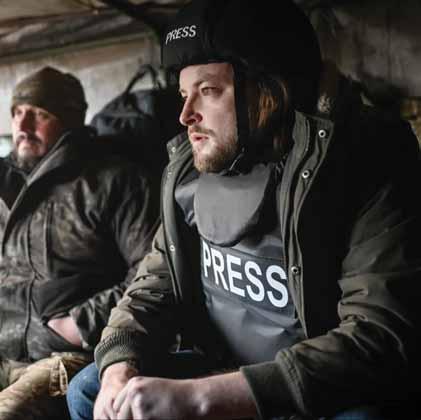
areas. The battle for Bakhmut, for instance, took almost a year — from late 2022 into the summer of 2023. But in Pokrovsk, Russian troops entered the city and were active in about 75 percent of it within two or three weeks. A huge factor in that is Ukraine’s shortage of manpower. Of course, Russia has its own limits. They’re having to pay ever higher sums to get men to sign up. So manpower isn’t an infinite resource for them either. The big question is which side will crack first. This war increasingly feels like an unstoppable force meeting an immovable object.
DOES UKRAINE HAVE A PLAN FOR SOLVING THE MANPOWER PROBLEM?
Several Ukrainian officers I spoke to believe the issue can be solved without dropping the draft age to 18–25. They argue the real solution lies in reforming the armed forces — specifically by holding incompetent officers accountable. Many soldiers desert because of poor leadership. There’s a large number of officers in the Ukrainian army who are simply unqualified or reckless, yet face no consequences for disastrous decisions that cost lives again and again. This discontent has been building for two years and is now being voiced more openly. Soldiers are speaking publicly because private complaints haven’t worked. Many hope the top levels of the army command
— and the president’s office — will finally impose real accountability.
LET’S TALK ABOUT POKROVSK. THE KREMLIN REPORTEDLY PUSHED ITS DEADLINE TO CAPTURE THE CITY FROM NOVEMBER 15 TO DECEMBER 15. DOES IT LOOK IMMINENT THAT POKROVSK WILL FALL?
It does seem like a foregone conclusion at this point. Russian troops are active in three-quarters of the city — consolidated in some areas, still infiltrating in others. The pocket around Pokrovsk and Myrnohrad is nearly cut off. One hopes that the Ukrainians have already withdrawn most of their troops, because otherwise they risk operational encirclement. If the pullout isn’t complete by the end of the year — if Ukrainian units are still in that area by December 31 — it’s likely not a good sign. They’re probably taking very heavy casualties and struggling to withdraw altogether.
WHAT WOULD THE FALL OF POKROVSK MEAN STRATEGICALLY AND TACTICALLY?
It would leave very little of Donbas under Ukrainian control. After Pokrovsk, only a handful of major urban centers remain. Konstantynivka, for example, is already three-quarters encircled, with Russians gaining a foothold inside. It’s
not a good scenario.
Lyman is in an equally bad position — almost cut off from resupply, accessible only across the river, and being relentlessly shelled. Then there are Slovyansk and Kramatorsk, which used to be the two untouched bastions in Donbas. But now, in the past month or two, Russian FPV drones have started operating inside those cities too, targeting both civilians and military personnel.
That’s essentially what’s left — four major cities, two of them already in serious trouble.
COULD THE FALL OF POKROVSK AFFECT PEACE TALKS? SOME ARGUE THAT SUCH LOSSES MIGHT FORCE UKRAINE INTO NEGOTIATIONS OR EVEN ACCEPTING RUSSIAN TERMS.
Yes, but people who argue that have been saying the same thing for three and a half years — after every setback. It doesn’t change much. The Russians still demand what they did on day one: complete capitulation. That’s not remotely acceptable to Ukrainians.
Even if Europe and the US cut off all support tomorrow, Ukraine would keep fighting under those conditions. It would be much harder, but they’d still fight. So we’re not any closer to a negotiated settlement than before.
FIGHTING IS ALSO INTENSIFYING IN ZAPORIZHZHIA AND KHARKIV. ARE THOSE THE NEXT TARGETS AFTER POKROVSK, OR WILL RUSSIA FOCUS ON TAKING ALL OF DONBAS FIRST?
Donbas definitely remains the main focus. In the Kharkiv region, the situation isn’t great — the city is contested — but it’s not yet critical for Ukraine. The Russian push toward Zaporizhzhia, however, does seem to have some momentum. We’ll have to see how far they can take it.
FINALLY — WHAT IS UKRAINE FACING AS WINTER APPROACHES? HOW BAD COULD IT BE?
All indications are that this might be the worst winter yet. The winter of 2022–2023 was the hardest to date, but Ukraine learned lessons and improved its resilience afterward. Now, though, Russia has changed its tactics — targeting the transmission points of the electrical grid instead of just the generation sites. That’s already caused blackouts even in central Kyiv. Most people expect this winter to be Ukraine’s hardest since 2014. It’s going to be a very tough one.
Georgian Dream Launches Criminal Case against Ex-PM Giorgi Gakharia
BY TEAM GT
The Prosecutor’s Office of Georgia has launched criminal proceedings against former Prime Minister and former Minister of Internal Affairs Giorgi Gakharia, in connection with two key episodes from 2019 — the June 20–21 protest events, widely known as “Gavrilov Night,” and the Chorchana checkpoint incident near the occupation line with the Tskhinvali region (“South Ossetia”).
At a press briefing on Wednesday, Prosecutor General Giorgi Gvarakidze announced that Gakharia is charged with organizing intentional grievous bodily harm during the 2019 protest outside Parliament and with abuse of official authority while holding public office.
“The charges concern the organization of intentional grievous bodily harm against more than two persons during a protest rally held near the Parliament building, and the abuse of official authority by a person holding state political office,” Gvarakidze stated. The charges carry a potential sentence

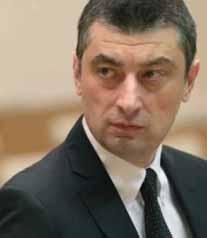
of up to 13 years in prison under Articles 25, 117(3)(m), and 333(2) of the Criminal Code of Georgia. The case revisits the events of Gavrilov Night, when demonstrations erupted after Russian MP Sergei Gavrilov was allowed to address Georgia’s Parliament from the Speaker’s chair on June 20, 2019. What began as a peaceful rally on Rustaveli Avenue quickly turned violent, with protesters attempting to storm the Parliament building.
According to the Prosecutor’s Office, then–Interior Minister Gakharia ordered special forces to use crowd-control weapons—including rubber bullets and tear gas—without prior warning or allowing peaceful demonstrators to disperse.
“He ordered Special Task Force officers to use special means collectively, in parallel mode, without warning and without giving peaceful participants the opportunity to leave the area,” Gvarakidze said.
Dozens of citizens were injured, including two who lost their eyesight and five who sustained grievous bodily harm.
The European Court of Human Rights (ECHR), in a May 7, 2024 ruling on the “June 20 case,” found that Georgia had violated Article 3 of the European Convention on Human Rights and called for renewed investigations and accountability for those responsible.
Gakharia, however, has denied issuing any such orders to use weapons against protesters on Gavrilov Night, maintaining that his actions as Interior Minister aimed to restore order and prevent further escalation.
The second episode under investigation concerns the Chorchana checkpoint near the occupation line, established on
August 24, 2019, while Gakharia was Interior Minister and Secretary of the National Security Council. Prosecutors allege he acted unilaterally, without consulting the Prime Minister, State Security Service, or the EU Monitoring Mission, and without authorization from the National Security Council.
Investigators claim his decision triggered an escalation from the Russianbacked de facto authorities of Tskhinvali, who subsequently occupied new positions on Georgian-controlled territory, seizing roughly 100 hectares of forest and deploying heavy military equipment toward nearby villages.
“Through these actions, Giorgi Gakharia deliberately exceeded his official authority, causing substantial violation of the legitimate interests of society and the state,” Gvarakidze said.
The Prosecutor’s Office has stated it will petition the Tbilisi City Court to impose pre-trial detention on Gakharia.
The investigation into both incidents remains ongoing.
Gakharia resigned as Prime Minister in February 2021 and later founded and now leads the opposition ‘For Georgia’ political party.
He is currently residing in Germany,
where he has been granted a long-term residence permit. He has stated that he will continue his political work from abroad, focusing on Georgia’s European integration, and that he does not plan to return to Tbilisi in the near future.
Responding to Gvarakidze’s announcement, Giorgi Sharashidze, an MP from the For Georgia party, condemned the prosecution as politically motivated:
“These charges are, of course, entirely absurd — nothing more than political retribution and revenge, something Bidzina Ivanishvili had already signaled before the 2024 parliamentary elections. So none of this came as a surprise; we were prepared. Both the Chorchana case and the June 20 case are clear examples of political retribution, having nothing to do with law or justice — nor will they ever. No one can intimidate us or force us to retreat. It is evident that these charges are intended to hinder us, but they will not succeed.”
The proceedings come as Georgian Dream, the ruling party, continues a series of investigations into former members of its own ranks — a move seen by some analysts as part of an internal reckoning ahead of next year’s parliamentary elections.
Neil Hauer. Source: X
Giorgi Gakharia. Source: BM.ge
Ukraine Latest: Pokrovsk under Siege as Energy War Deepens in Ukraine’s 4th Winter
COMPILED BY ANA DUMBADZE
As Russia’s full-scale invasion grinds toward a fourth winter, this past week in Ukraine has been dominated by two interconnected battles: the brutal urban struggle for the eastern city of Pokrovsk and an escalating campaign against energy infrastructure that is plunging millions into darkness. From 6 to 13 November, the front lines shifted only incrementally on the map, but the intensity of shelling, drone attacks and long-range strikes underscored that the war is now being fought as much over electricity grids and industrial capacity as over trenches and streets.
On the eastern front, Pokrovsk remains the epicenter. Russian forces are pushing deeper into the city and neighboring Myrnohrad, using dense fog to mask infiltration teams and armored columns.
A video geolocated by Reuters shows Russian soldiers entering Pokrovsk on motorbikes and battered civilian vehicles in scenes likened to “Mad Max,” visual proof that assault units have reached at least part of the urban area. Moscow claims its troops are advancing from several directions and that the city, long described by Russian media as “the gateway to Donetsk,” will provide a springboard toward the remaining Ukrainianheld strongholds of Kramatorsk and Sloviansk.
Kyiv emphatically denies that Pokrovsk is encircled or lost. The Ukrainian military says the “defense of the PokrovskoMyrnohrad agglomeration continues” and insists that food and ammunition supplies are still reaching the garrison, though spokespeople admit that logistics have become increasingly complicated. Ukrainian officials describe the “most intense fighting” as taking place in the city’s industrial zone, reflecting a pattern seen earlier in Bakhmut and Avdiivka, where factories and warehouses became last-ditch defensive bastions. Independent analysts at the Institute for the Study of War say Russia is trying to close a Ukrainian salient near Pokrovsk, especially along the northern shoulder of the pocket, but is struggling to concentrate enough forces to complete an encirclement.
Beyond Pokrovsk, Russia continues to grind forward along parts of the Donetsk and southern fronts. The Russian Defense
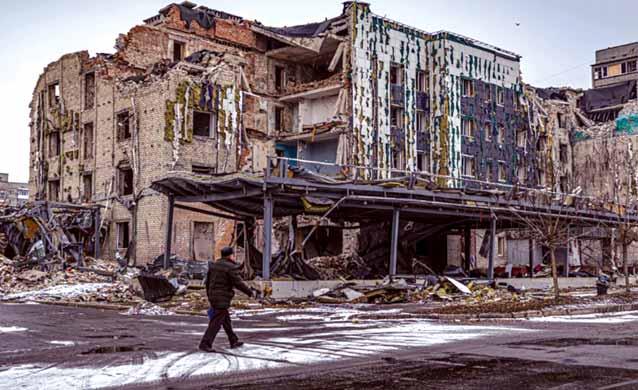
Ministry says its troops have captured Hnativka in Donetsk Oblast as well as Solodke and Nove in the neighbouring Zaporizhzhia region, claims that Kyiv has not fully confirmed but partially acknowledges through reports of “tactical withdrawals” from several settlements in the south. Ukraine’s top commander, General Oleksandr Syrskyi, has warned that fog and low cloud are limiting the effectiveness of Ukrainian drones while allowing Russian infantry to infiltrate positions in Zaporizhzhia, forcing “gruelling battles” to stabilize the line. This week he admitted that the situation in parts of Zaporizhzhia had “significantly worsened”, even as he stressed that the fiercest clashes are still in the besieged Pokrovsk area.
The northern sector around Kupiansk and Lyman also saw renewed pressure.
Russia says it is “curling around” south of Kupiansk, threatening Ukrainian supply routes in Kharkiv region. Ukrainian commanders report an uptick in fighting there, with artillery duels and small-unit assaults testing overstretched defenders.
President Volodymyr Zelensky has said around 170,000 Russian troops are concentrated in Donetsk alone, part of a front that now stretches roughly 1,250 kilometers. The Kremlin’s strategy appears to be a slow, corrosive advance
across multiple axes rather than a single decisive offensive, gambling that Ukraine’s shortages of manpower and ammunition will eventually force retreats. While territorial gains remain limited, Russia has significantly escalated its long-range attacks on Ukraine’s energy grid. Overnight on 8 November, Moscow launched a major wave of missiles and drones that struck power and gas infrastructure in multiple regions, including Kyiv, Poltava and Kharkiv. At least seven people were killed, among them residents in Dnipro, Kharkiv and Zaporizhzhia, when a drone hit an apartment building and other civilian targets near energy facilities. Ukraine’s state power operator reported that generating capacity briefly fell to “zero” the following day, forcing grid operators to rely on emergency imports and backup systems. By midweek, many areas of the country were enduring scheduled outages lasting 10–12 hours per day, with city streets lit by torches and generator hum replacing the usual urban noise.
Russian strikes on the Donetsk and Dnipropetrovsk regions this week demonstrated how closely the energy and battlefield campaigns are linked. Shelling in Kostiantynivka, a town west of Pokrovsk that serves as a logistics hub for the eastern front, killed at least one per-
Papuashvili: Brussels Chooses Confrontation Over Dialogue, has Strayed from European Values
BY TEAM GT
Parliament Speaker Shalva Papuashvili has accused Brussels of abandoning the core principles of dialogue and mutual understanding, saying the European Union has chosen confrontation instead, following Georgia’s exclusion from the upcoming Enlargement Forum scheduled for November 18 in Brussels.
Papuashvili claimed that the decision reflects a broader departure from European values, which he said are rooted in communication and cooperation rather than directives and attacks.
“There are two issues: this time, the spokesperson once again confirmed that this process was stopped by Brussels itself in June 2024. So once again, they have admitted with their own mouths what a disinformational, false narrative was being spread regarding the fact that the Georgian government had stopped the integration process. This is another confirmation and self-exposure,” Papuashvili stated.
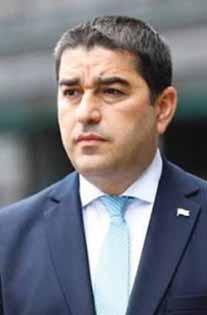
He added that Brussels’ stance illustrates its shift away from Europe’s founding ideals: “Brussels is choosing confrontation instead of dialogue, which is another sign of its deviation from European val-
ues. European values, as we Georgians understand them and of which we are co-creators, are dialogue, not confrontation — conversations, not directives; understanding the interests of others, not giving instructions. Unfortunately, Brussels has strayed from these values, and the result is the confrontational tone, attacks, and rhetoric we now hear against the Georgian people,” the Speaker said.
The comments came after Guillaume Mercier, the European Commission’s spokesperson for Enlargement, International Partnership, and the Mediterranean, confirmed to Euroscope editor Tamar Nutsubidze that Georgia has not been invited to the EU Enlargement Forum. Mercier also noted that Brussels has reduced direct contacts with the Georgian government amid rising political tensions and concerns over Georgia’s democratic trajectory.
Papuashvili’s remarks reflect the escalating strain in EU-Georgia relations, following the European Commission’s latest enlargement report, which described Georgia as a “candidate country in name only” and urged the government to reverse its democratic backsliding.
facility that produces polymers used in composite materials for the Russian military. Ukrainian sources say they also targeted a pumping station at the Hvardiiske oil depot in occupied Crimea and struck the Saratov oil refinery, a major producer of petroleum products. Russia, for its part, reported destroying Ukrainian naval drones near the Black Sea port of Tuapse, whose fuel export infrastructure was damaged in an earlier Ukrainian attack. These reciprocal strikes highlight how both sides are using relatively cheap drones to hit high-value energy and industrial targets far behind the front line.
son and wounded others, while further attacks in the Dnipropetrovsk region injured civilians and damaged infrastructure. In Zaporizhzhia, an explosion from unexploded ammunition inside a hospital ward injured a man, a reminder of the lingering dangers posed by years of shelling. Ukrainian officials describe these attacks as part of a deliberate strategy of “energy terror” designed to break civilian morale and complicate military logistics.
Kyiv, however, is responding with its own long-range campaign aimed at Russia’s energy and war-supporting infrastructure. On Sunday, Ukrainian drones struck power and heating facilities across the Belgorod, Kursk and Voronezh regions, leaving more than 20,000 residents without electricity and cutting power to 10 municipalities in Kursk after a fire at a power plant in the village of Korenevo. Regional officials reported a separate fire at a heating facility in Voronezh and said repairs would take days. Russia’s Defense Ministry claimed to have shot down dozens of drones, but local authorities acknowledged significant damage to electricity and heating networks.
Earlier in the week, Ukrainian forces hit the Stavrolen chemical plant in Budionnovsk in Russia’s Stavropol region, a
The human cost of this week’s escalation is still being counted. In Ukraine, at least seven people were killed and dozens injured in the major nationwide strike on 8 November alone, with further casualties in subsequent shelling and drone attacks in Donetsk, Dnipropetrovsk, Kharkiv and Zaporizhzhia regions. Millions are enduring long blackouts in sub-zero temperatures, relying on improvised stoves, power banks and neighborhood “warm points” to get through the night. In Russia, Ukrainian drone and artillery strikes have left tens of thousands temporarily without power in border regions and caused sporadic civilian casualties; a man wounded in a drone attack in the village of Belyanka in Belgorod died in hospital this week, and other strikes in the region have previously killed several residents. Precise military casualty figures on both sides remain classified and are impossible to verify, but Ukrainian and Western estimates suggest that Russia is paying a heavy price in personnel and equipment for its incremental gains.
Diplomatically, the week brought renewed statements of support but no sign of a breakthrough toward ending the war. G7 foreign ministers meeting in Canada strongly condemned Russia’s attacks on energy facilities and reiterated that support for Ukraine’s defense and energy security would continue. Several governments announced new financial or technical assistance, including funding for emergency repairs to Ukraine’s power and heating systems, and additional sanctions targeting Russia’s defense-industrial and energy sectors. European governments continued internal discussions over multi-year funding plans for Ukraine and the use of profits from frozen Russian assets, while Kyiv prepared to receive another tranche of EU macro-financial support.

Kaladze Begins Weekly Citizen Meetings
BY MARIAM RAZMADZE
Tbilisi Mayor Kakha Kaladze has launched a new initiative of weekly meetings with residents to directly address issues within the municipality’s competence. Tbilisi City Hall reported that the first session was held today with the participation of the heads of relevant municipal departments, covering a wide range of topics including healthcare, social services, architecture, urban development and transportation.
During the meeting, citizens presented specific problems and requests to the
mayor, who pledged assistance in resolving them through the appropriate City Hall services. Kaladze emphasized that such meetings strengthen communication between the municipality and the public, ensuring that local concerns are heard and addressed efficiently.
Starting this week, the meetings will take place every Wednesday from 16:00 to 18:00 at Tbilisi City Hall. Residents who wish to meet with the mayor can submit an application at the Citizens’ Service Center located on the first floor of City Hall. The application must specify the issue they wish to discuss, and a meeting will be arranged provided the issue falls within the scope of municipal authority.
In Pokrovsk, an industrial city in eastern Ukraine's Donetsk region. Photo by Anton Shtuka for NPR
Kakha Kaladze meets a Tbilisi citizen. Source: 1TV
Shalva Papuashvili. Source: FB
“Trump sees China as the long war, Russia as the short one, and Europe as the past.”
INTERVIEW BY VAZHA TAVBERIDZE
With Donald Trump’s return to the White House, questions about how his foreign-policy worldview has reshaped the international order have taken on unprecedented urgency. Has his “America First” doctrine resulted in disengagement, or merely a harderedged realpolitik?
To help unpack the logic behind Trump’s approach, from NATO and the European Union to Ukraine and beyond, Radio Free Europe/Radio Liberty’s Georgian Service spoke with Victor Davis Hanson, senior fellow at the Hoover Institution at Stanford University, historian of classical warfare, and one of America’s most prominent conservative commentators.
In this conversation, Hanson discusses what he calls Trump’s Jacksonian philosophy, his views on deterrence and alliances, and how the former president’s strategy could alter the course of the war in Ukraine and the West’s confrontation with Russia and China.
LET ME BEGIN WITH THE ROADSWEEPING QUESTION: WHAT HAS PRESIDENT TRUMP’S SECOND COMING MEANT FOR THE REST OF THE WORLD, AS FAR AS FOREIGN POLICY GOES?
Well, I think there has been a lot of misinterpretation. He has been called everything from an interventionist to a bully to an isolationist, but I think the best term, in American political language, is Jacksonian.
By that I mean this: he believes that, in order to avoid what he calls non-productive wars or optional quagmires—the kind we saw for 20 years in Afghanistan, or a decade in Iraq, or the nihilistic bombing of Libya—you need deterrence. And deterrence, in his worldview, is very black-and-white. You have to be visibly and consistently supportive of your friends, and make sure your enemies never feel emboldened to try something reckless.
At the same time, he is deeply skeptical of multilateral organizations that sound utopian on paper and don’t work in practice. A good example: he says he supports NATO, but he also insists on remembering what the acronym stands for—the North Atlantic Treaty Organization. If members are not equipped to defend one another, or if some are in regular disputes with each other, then the entire credibility of Article 5 breaks down. That’s not nihilism; that’s a warning. If NATO wants to be a real alliance, then everyone has to actually act like an ally.
HE IS, HOWEVER, NOT SO KEEN ON THE EUROPEAN UNION, WHICH ISN’T UTOPIAN AND, DESPITE ALL THE CRITICISMS, IS STILL A WORKING CONCEPT.
The EU is already reforming itself in a direction he would approve of. In theory, the EU should be a super-power: a population roughly equal to the US, an economy of similar size, a strong industrial base. Many Americans—Trump especially—would welcome Europe taking on more responsibility: military, political, economic.
But the EU, in the American perception, has been run from the top down by a Davos-style elite, in ways that feel increasingly undemocratic. Whether it’s
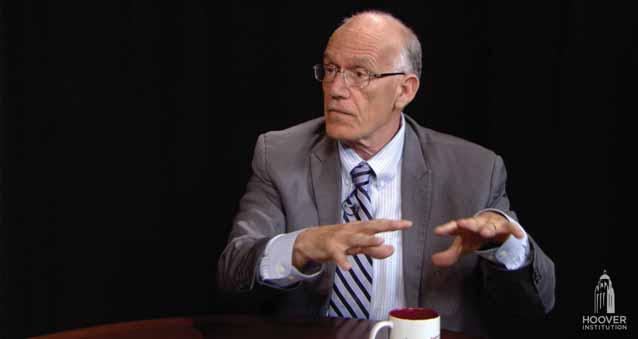
climate mandates, open-border doctrines, or the DEI (diversity, equity, inclusion) agenda—there is real backlash, not just in Eastern Europe but in Western Europe too. Look at the farmers’ protests in the Netherlands, the street unrest in parts of France. People are starting to question whether they want that degree of bureaucratic coercion in their daily lives.
EARLIER, YOU MENTIONED FRONTIER STATES GETTING INTO SQUABBLES. IF WE APPLY THAT TO NATO’S EASTERN FLANK, THE DISAGREEMENTS AREN’T BETWEEN MEMBERS—ANY SPECIFIC EXAMPLES YOU MEAN?
Well, we all know who the actual aggressor is: Vladimir Putin. But what Trump would say to the Baltic states, or to Eastern European NATO members more broadly, is something like this: “If you believe Putin is a real threat, and if you want NATO—this nuclear alliance with 7,000 Russian warheads pointed at it—to stand united, then you must ensure that every member is on the same page before the crisis comes. You cannot have people in Amsterdam or Milan saying: ‘If Russia invades Estonia, I’m not flying my army there.’ And then expect the Americans, who have gone to Europe twice in the last century at enormous cost, to do it again.” That is Trump’s message. And it is the responsibility of the Eastern states, those most directly threatened, to make the argument persuasively to the rest of NATO. Because when the crisis comes, the fear is that Western Europeans will say, “We don’t want to get involved,” and the Eastern Europeans will say, “But you promised.” And then everyone turns to Washington, again, to do the job.
IF I WERE TO ADVOCATE ON BEHALF OF THE EASTERN FLANK—BALTIC STATES, POLAND, ETC.—I’D SAY THEY'VE BEEN WARNING THE REST OF THE ALLIANCE FOR FIFTEEN YEARS, LOUDLY. THE PROBLEM IS NOT THEIR SILENCE, BUT WESTERN DEAFNESS.
You are absolutely right. And I think many in the Trump team agree with that.
I don’t want to revive the inflammatory “Old Europe vs. New Europe” phrase from Donald Rumsfeld, but it’s clear that the Trump circle feels much closer— culturally, politically, even temperamentally—to Eastern Europe than to Brussels
or Paris. They see Eastern Europe as more realistic, more practical, less ideological. And that worldview aligns far more naturally with the Trump people. Whereas the Obama and Biden administrations tended to see Orbán’s Hungary, or Poland’s conservative government, or Slovakia under Fico, as “problems” to be managed—Trump’s team sees them instead as potential partners who are being punished for not embracing the Western European ideological agenda.
LET’S MOVE TO UKRAINE.
TRUMP SAID HE COULD “END THE WAR IN A MONTH.” WHAT HAPPENED IN PRACTICE?
His argument was this: it was not the official position of Ukraine in 2014—nor of the Obama, Trump, or pre-2022 Biden administrations—to retake Crimea or the Donbas by force. Those territories were already de facto occupied. NATO membership for Ukraine was also not a real policy until recently.
But there was one unique difference: Trump was the first president to send Kyiv lethal weapons—Javelins, while Obama refused. Trump was also first to directly confront Putin: he authorized the strike that killed 200 Wagner fighters, he withdrew from the INF missile treaty, he sanctioned oligarchs, he flooded the world with cheap oil to hurt Moscow.
So when Trump says the war “could be ended,” what he means is a negotiation along these lines: A) Ukraine gets full arming and some security guarantees, but not NATO membership, B) Russia keeps what it already held before February 2022, but not the new gains, C) There is a demilitarized zone, D) Ukraine joins the EU, but not NATO, and E) Putin is allowed to sell this as “preventing NATO expansion” to save face.
That’s his concept of a “deal.” Something like the armistice that ended World War I: freeze the front, stop the fighting, then negotiate. And if talks fail, either side could resume combat.
He has to find ways to pressure Putin as well as Zelensky—from a position of strength. And, remember: Trump has two main tools vis-à-vis Russia that he already used successfully: 1) Oil supply and pricing. Flooding the world with cheap oil cripples Russia and Iran financially. Biden quietly adopted Trump’s strategy in 2023—US oil production hit record highs. Trump thinks he can push that even further, though experts disagree on whether it’s geo-
logically possible.
2) Triangulation. Like Kissinger, Trump believes Russia should fear becoming China’s junior colony more than it fears the West. A rich but depopulated country bordering a population-giant superpower is not in a good long-term position. Trump would try to exploit that insecurity.
His message to Putin goes something like: “You caused this war. You’ve lost over a million troops, dead and wounded. Your only winning move now is to freeze the conflict, claim you stopped NATO expansion, and sell that at home as victory. Otherwise this bleeds you for another decade.”
Whether Putin cares about that is another story—especially now, when he believes he’s winning.
IF PUTIN IS CONVINCED HE’S WINNING, ISN’T THIS THE WORST POSSIBLE TIME TO NEGOTIATE?
Probably, yes. Right now, from Putin’s perspective, things look good: Ukraine is running out of manpower, while Europe is running out of political will. US support is divided and uncertain, and Russia is still trading with India, China, the Gulf, and much of the Global South. He thinks time is on his side.
IF PUTIN IS WILLING TO PLAY THE LONG GAME, WILL TRUMP PLAY ALONG? WHAT IS HIS STRATEGIC POSITION ON UKRAINE?
He will not abandon Ukraine. But he also will not write endless, open-ended checks. His formula, as best as we can infer from the people around him, is: Keep arming Ukraine, but not forever-war funding, thus forcing Europe to match US military aid instead of outsourcing the bill to Washington; offer Russia a face-saving exit that freezes the conflict and block NATO membership for Ukraine, but ensure some form of either bilateral or EU-level security guarantees. And finally, shift the US grand strategy toward China, not Europe. Trump sees China as the long war. Russia is the short war. Europe is the past war. Everything else— NATO reform, Ukraine negotiations, Middle East deals, oil strategy, sanctions—flows from that one organizing principle.
WHAT HAPPENS IF UKRAINE REFUSES THE KIND OF
DEAL TRUMP IS OFFERING? LEGALLY, POLITICALLY, DIPLOMATICALLY—WHAT THEN?
Then Ukraine faces a hard reality: it cannot fight indefinitely without American weapons, money, and intelligence. Europe cannot replace that support—either industrially or politically. And Trump knows this. His leverage is not ideological; it is material. If Kyiv rejects a ceasefire and insists on total territorial restoration, Trump’s response would likely be: “That is your right. But it is not America’s obligation to fund your war forever.” And he will put the full burden onto Europe: “If you think victory is realistic, you pay for it.” From Trump’s point of view, it is not anti-Ukrainian to say: “You cannot make strategic decisions with someone else’s resources.” He sees that as common sense, not betrayal.
YOU KEEP SAYING TRUMP WON’T ABANDON UKRAINE. BUT THERE ARE PEOPLE IN HIS CAMP WHO ABSOLUTELY WANT TO CUT THEM OFF. HOW DOES HE MANAGE THAT, WHAT DOES THAT BALANCING ACT LOOK LIKE?
By owning the narrative before they do. The populist camp believes: “Ukraine was dragged into a war it could never win, on promises America never meant to keep.” The establishment camp believes: “If the West abandons Ukraine, Russia will devour it and keep going.” Trump’s solution is to split the difference: Keep Ukraine armed, freeze the battlefield, stop mass spending, declare a diplomatic win and finally pivot to China.
That way, the populists get what they want: “No more blank check forever-war.” The strategists also get what they want: “Ukraine survives and Russia is contained. And Trump gets: “I ended a war Biden couldn’t.”
IF TRUMP FREEZES THE WAR, WHO WINS— RUSSIA OR UKRAINE?
Neither. That’s the point. A frozen conflict means: Ukraine survives as a sovereign state, while NATO avoids a world war. The US stops funding an open-ended conflict and Europe is forced to prove whether it has strategic will or not. Trump doesn’t believe in perfect outcomes. He believes in leverage, not morality. His worldview is: “If you can’t win a war, you end it. If you can’t force surrender, you freeze the front. If you can’t make peace, you impose a deal.” That is how he sees business, diplomacy, and war.
YOU NOTED THAT TRUMP SEES CHINA AS THE REAL LONG-TERM THREAT. WHERE DOES UKRAINE FIT IN THAT CHESSBOARD?
Ukraine, to Trump, is not the endgame— it's the distraction. He believes, and quite rightly, that China wants the US stuck in Europe forever. That Ukraine drains US munitions needed for a Taiwan war, that Russia could be flipped against China if the US stops pushing Moscow into Beijing’s arms, and that Europe should defend Europe, while the US re-arms for the Pacific. In his mind, the global future is decided in the South China Sea, not the Donbas. So he wants the Ukraine war resolved, not won, so that America can finally pivot to the only adversary that matters in 2050, not 1950: China.
Victor Davis Hanson. Source: Hoover.org
Georgia Strengthens Aquaculture Food Safety with EU- and FAO-supported Training

BY MARIAM RAZMADZE
Georgia’s aquaculture sector has taken a big step toward improving food safety and aligning national practices with European Union (EU) standards through a specialised training initiative supported by the Food and Agriculture Organization of the United Nations (FAO) under the ENPARD IV programme, funded by the EU and Sweden.
The four-day training brought together fish farmers, private-sector representatives, regulatory authorities and members of fish farmers’ associations. Combining classroom instruction with practical onfarm sessions, the programme strengthenedparticipants’ technical capacity in evaluating, monitoring and enforcing food safety standards throughout the aquaculture production chain.
Participants learned to identify and assess potential hazards in aquaculture production, apply Good Aquaculture Practices (GAqP) and Hazard Analysis and Critical Control Point (HACCP) principles and conduct standardised inspections using new checklists, documentation forms, and sampling protocols. The course also focused on preparing evidence-based inspection reports.
A main component of the initiative was the creation of a technically qualified team of trainers who will share their knowledge across the country, ensuring the consistent application of food safety practices and supporting the long-term sustainability of Georgia’s aquaculture inspection system.
“This training marks an important step toward strengthening Georgia’s aquaculture inspection system and aligning national practices with EU standards,” said Guido Agostinucci, FAO Programme Manager. “By equipping key stakehold-
ers with technical knowledge and practical insights, FAO is helping promote consistent food safety standards and sector-wide cooperation.”
Denis Reiss, Programme Officer for Sustainable Food Systems at the Delegation of the European Union to Georgia, highlighted the initiative’s broader impact: “Enhancing the credibility and accountability of inspection systems across the aquaculture value chain is essential for Georgia’s compliance with international food safety standards and EU regulations. We welcome this ENPARD IV activity as it contributes to safer food production and a more sustainable aquaculture sector.”
The training forms part of FAO’s ongoing support to strengthen Georgia’s national food safety system and enhance its alignment with international standards. Through ENPARD IV, the EU, FAO and Sweden continue to help build a safer, more competitive aquaculture industry in Georgia.
Georgia and Turkey Strengthen Cooperation in Infrastructure and Water Management

Medicine. Source: University of West Florida Pressbooks
Georgia to Invest GEL120 Million in Primary Healthcare Reform
BY MARIAM RAZMADZE
Georgia’s government is launching a large-scale reform of the country’s primary healthcare system, with an investment of GEL120 million planned over the next four years. The initiative wants to expand access to quality medical services and strengthen preventive care.
Minister of Health Mikheil Sarjveladze stated that the reform builds on a recently completed pilot phase, the results of which are currently being analyzed. Once finalized, the program will be implemented nationwide, starting early next year. “From the beginning of next year, we will be able to offer every citizen
across the country high-quality, resultfocused primary healthcare services,” the minister stated.
A main component of the reform is the enhancement of working conditions for healthcare professionals. Salaries for doctors and nurses in the primary care sector will be increased, accompanied by new financial incentive mechanisms designed to improve efficiency and quality of care.
Sarjveladze emphasized that primary healthcare forms the foundation of the medical system as it provides citizens with their first point of contact for essential advice, preventive care and early disease detection. Currently, 1,004 primary care institutions operate across Georgia, staffed by more than 1,500 doctors who offer consultations, screenings and referrals to specialists when necessary.
BTC Pipeline Transports 159 Million Barrels of Crude in First Nine Months of 2025

BY MARIAM RAZMADZE
The Georgian Ministry of Infrastructure reported that the country is taking steps to deepen partnership in infrastructure development with Turkey. Minister Revaz Sokhadze is leading an official delegation, comprising of Levan Darakhvelidze, Chairman of the Roads Department, along with his
Infrastructure development. Source: OECD
deputies, to Turkey where high-level meetings are being held to explore new avenues of cooperation and knowledge exchange.
The visit began in Ankara with a meeting between Georgia’s Deputy Minister of Infrastructure, Giorgi Koberidze, and Mehmet Akif Balta, Director of Turkey’s General Agency of State Waters. The discussions focused on expanding bilateral collaboration in water supply and wastewater management.
Balta briefed the Georgian side on the
operations and ongoing projects of Turkey’s General Directorate of Water Supply and Sewerage. He reaffirmed Turkey’s readiness to assist Georgia by sharing its extensive technical experience and best practices.
“We are willing and prepared to share our technical expertise with our friendly neighbor, Georgia. We are also ready to host representatives from Georgia’s relevant agencies so they can observe our projects and results firsthand,” said Balta.
Deputy Minister Koberidze expressed gratitude for Turkey’s hospitality and commended its remarkable progress in infrastructure development.
“Turkey is among the world’s leaders in infrastructure development. It is vital for Georgia to learn from this experience, adopt advanced technologies, and implement best practices in both current and future projects,” he stated.
As part of the ongoing visit, Minister Revaz Sokhadze is expected to meet with Turkey’s Minister of Transport and Infrastructure to discuss broader cooperation in the transport sector. The Georgian delegation will also visit several major transport infrastructure facilities to gain insights into Turkey’s development strategies and explore future joint initiatives.
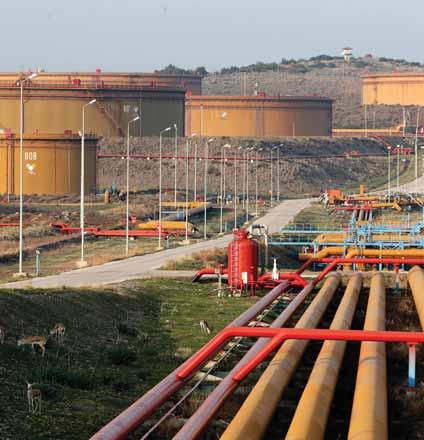
The BTC pipeline.Source: Reuters
BY MARIAM RAZMADZE
BBY TEAM GT
The Georgian National Sta-
P’s latest performance report revealed that crude oil transportation through the BakuTbilisi-Ceyhan (BTC) pipeline declined slightly in the first nine months of 2025. From January to September 2025, the pipeline carried around 159 million barrels of crude oil, equivalent to 19 million tons, which were subsequently loaded onto 216 tankers at the Ceyhan terminal.
This figure shows a decrease of 6 million barrels compared to the same period in 2024, when BTC transported approximately 165 million barrels or more than 22 million tons. Despite the decline, the pipeline plays a critical role in deliver-
ing Caspian crude to global markets through the Mediterranean.
BP’s report pointed out that during the reporting period, BTC’s operating expenses amounted to USD 97 million, while capital expenditures reached USD 50 million.
Since beginning operations in June 2006, the 1,768-kilometer BTC pipeline has transported more than 4.6 billion barrels of crude oil, over 605 million tons in total, and loaded 6,078 tankers for export to international destinations.
The BTC pipeline is operated by bp and jointly owned by a consortium of international energy companies: bp (30.1%), SOCAR (32.97%), MOL (8.9%), TPAO (6.53%), Eni (5%), TotalEnergies (5%), ITOCHU
From the training. Source: FAO in Georgia
Why I Write

BY TONY HANMER
Good question. For me, it seems to be the other half of reading, which I also did as soon as I was able. In fact, my earliest story is still in my possession, a 1-pager miraculously preserved along with masses of school reports and other memorabilia.
I was 7 years old (51 years ago!), and won a prize in a writing contest for that age in Rhodesia, now Zimbabwe, where our family lived for 7 years.
I have memories of my father reading to my sister and me before bed. One book which stands out is The Lone Patrol, by John Finnemore, although I remember nothing at all of its contents. But I have the copy owned by his sister, my aunt, which passed to me after her death, and is possibly the very same one which he read to us. I will soon start re-reading it and see if anything comes back. No less prolific and successful an author than Stephen King (love him or not) wrote in “On Writing” that only two things are necessary to become a writer: read, and write. Don’t wait. Just do it. Start anytime, then learn the rules, either by study or by observation. I seem to have followed this advice my whole life since that precocious young age of 7. Voraciously reading, copiously writing. Keeping notes of story ideas. (Reason why human-alien contact led to their mutually assured destruction in war: the spouses of both ambassadors at First Contact somehow chose the exact same fabric for their outfits, and killed each other on sight. This top secret information is discovered by the last surviving soldier of one of the sides, probably the alien, not the human. Title: Fashionably Late).
Writing diaries, especially when I was in a new location, which my father’s engineering job, building power stations, assured was frequently. Continuing this when I left home, especially in St Petersburg, Russia (1992-7) and Georgia (1999 to present).
Writing a handful of newspaper articles
for my local newspaper in Stony Plain, Canada, when I began traveling solo in 1989. Then, starting with Georgia Today in March 2011, 15th anniversary coming up. Simply by writing the paper an email from Mestia offering regular work from Mestia, Svaneti. Weekly ever since.
Reading, always reading. Science fiction, fantasy, history, science, recreational mathematics, biography. Almost anything, if it’s well written. In this way, taking in the language I would then give back in my own words. Even, as a child, absorbing information by reading the family’s many-volume encyclopedia…
Self-aware enough to be able to analyze my habits and inner world. I am an introvert, but not purely.
Noting which few authors have achieved the feat of being both good and bestselling. For me, John Le Carré tops this list. CS Lewis, JRR Tolkien, Stephen R Donaldson, Frank Herbert, Greg Bear, Greg Egan, Mary Doria Russell, CJ Cherryh. The old classics, too, rightly named. John Grisham to me isn’t literature of a high class, but still entertaining as anything, enough so that I’ll read everything he, too, writes.
Even collecting comics, as a teenager, joining the X-men with issue 104 and continuing to 150 until I started traveling and online comics weren’t yet a thing. Picking this medium up again recently, partly for nostalgia, partly to see if middle-aged me feels the same about it as my teenage self (not, but that’s OK).
The frustration of catching up with a living author, and then having to wait for his or her next work. Anticipation when it comes out. Sadness when they die, for all the usual reasons PLUS knowing that’s the end.
Fury when others take up the universe of another author and spoil it completely with much worse writing and veering wildly off canon. Dune post-Herbert, I’m looking at you. So disappointing: you want more, but realize very early on that it just won’t satisfy at all, and abandon it with prejudice. They’re laughing all the way to the bank, unstoppable, and I mourn.
Finally, joining my two main creative worlds of words and images in my fantastical short stories set in Svaneti, all based on and illustrated by my own photos, and first serialized right here in this newspaper. Neither medium is complete without the other, for me; they enrich each other. There are few things more satisfying to me, creatively. This is me, the reader and writer. What about you?
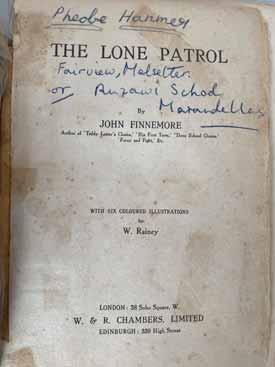
Tony Hanmer has lived in Georgia since 1999, in Svaneti since 2007, and been a weekly writer and photographer for GT since early 2011. He runs the “Svaneti Renaissance” Facebook group, now with over 2000 members, at www.facebook.com/ groups/SvanetiRenaissance/ He and his wife also run their own guest house in Etseri: www.facebook.com/hanmer. house.svaneti

Illegal Logging Bust in Tianeti Highlights Georgia’s Ongoing Forest Protection Efforts
BY TEAM GT
An illegal logging operation has been uncovered in the state forest of Tianeti, where employees of the Mtskheta-Mtianeti Forestry Service identified a large-scale case of unauthorized timber extraction and transportation.
The National Forestry Agency (NFA) stated that the offender was caught transporting nearly nine cubic meters of beech timber using an off-road vehicle. The violation was detected through video traps installed in the forest for monitoring purposes. The vehicle has been sealed, and the illegally harvested wood has been transferred to the Tianeti operations yard for further handling.
Kakhaber Tsertsvadze, Head of the National Forestry Agency, emphasized that the agency’s teams conduct 24-hour patrols to prevent and combat illegal use of forest resources. He mentioned that many recent violations have been identified using modern monitoring technologies, including drones and video surveillance systems.
"All cases of illegal exploitation of natural resources are subject to strict sanctions under the law," Tsertsvadze added.
Illegal logging has long been a significant challenge in Georgia. The country’s forests cover roughly 40% of its territory, with diverse ecosystems ranging from lowland beech and oak forests to high mountain pine and fir stands. Forests are vital not only for biodiversity but also for regulating soil stability, water
resources, and climate, and they provide critical income for local communities through legal timber production and eco-tourism.
Despite legal protections, unauthorized timber harvesting has persisted, driven by demand for construction materials, firewood, and commercial export. Studies estimate that illegal logging in Georgia accounts for a substantial portion of total timber production, undermining sustainable forest management and contributing to soil erosion and habitat loss. Regions like Mtskheta-Mtianeti, where Tianeti is located, are particularly affected due to their rich beech and oak forests and relatively limited local enforcement capacity.
LEGAL CONSEQUENCES
Georgia has strengthened legal measures against illegal logging, with both administrative fines and criminal penalties depending on the severity of the violation. Administrative fines for smaller or technical violations range from GEL 500 up to GEL 4,000, often including confiscation of illegally harvested timber or processing equipment.
Criminal penalties can apply for largescale or repeated illegal logging, especially in state forests or protected areas. Individuals caught illegally harvesting or transporting timber may face 1–3 years in prison, with higher penalties for largescale operations — up to 5–7 years in certain cases. The laws also allow for confiscation of timber and equipment, as well as additional fines, reflecting Georgia’s push to deter illegal exploitation of its forests.
ONGOING EFFORTS
Multiple stakeholders are involved in
combating illegal logging. The National Forestry Agency leads enforcement operations, often in collaboration with the Ministry of Environmental Protection and Agriculture. Non-governmental organizations, including the Georgian Forest Protection Network and WWF Georgia, actively campaign for stronger forest protection measures, providing research, community education, and support for monitoring technologies. International partners, such as the European Union and the UN Development Programme, have funded initiatives to modernize forest monitoring, introduce satellite and drone surveillance, and improve the legal framework for forest resource management.
Recent efforts to curb illegal logging in Georgia have shown measurable progress. The introduction of video traps, GPS tracking of timber transport, and community reporting mechanisms has led to increased detection and prosecution of offenders. Legal reforms now impose stricter fines and imprisonment for large-scale illegal timber extraction, signaling a shift toward more stringent enforcement.
Nevertheless, experts warn that combating illegal logging requires sustained investment in both enforcement and community engagement, ensuring that local populations have alternative livelihoods and incentives to protect forests rather than exploit them illegally.
The Tianeti case highlights both the ongoing challenges and the effectiveness of modern monitoring techniques, demonstrating that with vigilant oversight, illegal activities in Georgia’s forests can be intercepted before causing further environmental damage.
In Numbers: Georgians Taking Tourist Trips Abroad up 3% in Q3 2025
BY MARIAM RAZMADZE
New data from the National Statistics Office revealed that Georgian residents made 412,000 tourist visits abroad in the third quarter of 2025, a 3% increase compared to the same period last year.
Despite this growth, the overall number of outbound visits totaled 599,700, slightly down by 3,000 from the previous year. The decline was driven mainly by a drop in one-day trips, which fell by 14,000 to 187,000. Geostat notes that such short visits are typically made for shopping purposes, particularly through the Sarpi border crossing with Turkey.

A
plane in flight. Source: iStock
Georgia detected four cases of illegal logging and timber transport this August. Source: FB
Tourist visits, defined as trips lasting more than one day, continued to rise, with steady growth observed especially toward European Union countries. Visits to EU destinations reached
BLOG
Education Minister: Tutoring in Georgia Not Subject to Legal Restrictions

BY MARIAM RAZMADZE
Georgia’s Minister of Education, Science and Youth, Givi Mikanadze, has clarified that private tutoring in the country does not require any official permits and is not regulated by law. The Minister emphasized that tutoring represents a personal agreement between individuals, conducted outside official working hours, and therefore falls outside the scope of legal framework.
“Tutoring is an agreement based on an
individual relationship where people agree to carry out a specific activity outside their primary work responsibilities.
Because of this, it is not subject to legal regulation,” Mikanadze stated.
The Ministry’s explanation dictates that while private tutoring remains entirely unregulated, a distinction must be made when it comes to training centers or institutions. In such cases, teachers formally employed by an organization must obtain consent from their main employer to ensure that their additional work does not interfere with their primary duties.
“If a teacher fully performs their main duties and has the time and resources
for additional work, directors of educational institutions are expected to issue the relevant permits. The only requirement is that there is no overlap in working hours between the teacher’s primary and secondary employment,” the Minister noted.
Mikanadze also criticized what he described as ‘radical groups’ for spreading misinformation about the alleged regulation of tutoring. He said the claims suggesting that tutoring requires official approval are false.
“We want to clarify once again that tutoring is not and cannot be subject to any permits or restrictions,” the Minister stated.
Musk – What Our Phone Is Really Doing to Us
OP-ED BY NUGZAR B. RUHADZE
In our childhood, we were often told a fairy tale in which a magic mirror sat in the hands of a beautiful princess or a wicked witch. We could hardly believe it was true, but tended anyway to maintain faith that magic mirrors truly existed. Just in the twinkle of an eye, something smarter than a plain magic mirror was invented by man, which we now carry everywhere at all times, touch and look at, pick up or disconnect from at least a hundred times a day. Our smartphone is the last thing we see before we go to sleep and the first thing we touch as soon as we open our eyes in the morning. And, most importantly, it is not I who says this but the great Elon Musk himself, who thinks that our smartphone is not just a trivial tool. It changes our mood, alters our focus, and modifies our decisions. We usually feel apprehensive if we accidentally leave it in another room and panic out of our wits upon noticing that it is not in one of our pockets, the disorientation being so severe that we seem to have lost part of ourselves. Elon also says that somewhere along the way between the moment smartphones became part of our lives and today, something essential has changed – we started living with their help, and we began experiencing reality through a screen. Here is what he literally gives as a mind-boggling example: we are at a concert, and instead of watching the performance with our own eyes, we are watching it through our phone screen, recording something we’ll probably never watch again; or we are at dinner with friends, and we’re photographing our food before we taste it so that we can share it with others; or we are on vacation in a beautiful place, but we are more concerned with getting the perfect photo for our social media than actually absorb-


Chachuna National Park. Source: National Parks
Georgia’s National Wildlife Agency Launches Restoration Effort for Red List Oak Species
BY MARIAM RAZMADZE
As part of the Red List Species Conservation Program, Georgia’s National Wildlife Agency is launching a largescale initiative to restore the endangered floodplain oak (Quercus pedunculiflora), a species listed as Vulnerable in Georgia’s Red List. Agency specialists have collected around 20,000 acorns of the floodplain oak within the Chachuna Managed
Reserve. The seeds have been planted in a specially designated area equipped with optimal conditions to support healthy growth and development. Once the seedlings mature, they will be transplanted into their natural habitats, sites where the species historically thrived. The floodplain oak was once widely distributed across eastern Georgia, particularly along the floodplains of the Mtkvari, Aragvi, Ksani, Liakhvi, Iori and Alazani rivers. The species is distinguished by its long-stalked acorns which have earned it the local name ‘long-stalked oak.’
Georgia Prepares to Host Junior Eurovision 2025 in Tbilisi
BY MARIAM RAZMADZE


ing the beauty of where we happen to be.
Elon Musk, the genius observer of the real-life canvas, says that he always feels a strange emptiness when the battery dies and suddenly feels cut off from the world even when he is standing among people. "Our smartphones connect across continents and let us run our business from anywhere in the world, "he continues, with a childish amazement in his tone, "we order food, call a ride, transfer money, learn a new skill, find answers to the most complex questions, all from a device that fits in our palm." Moreover, he says, via our cellphones, we have access to more information than the greatest libraries of ancient civilizations. And here is what he says the phones are doing to us at the same time: they know more about us than most people in our lives; they know where we were today, what we searched for last week, who we talked to, how many hours we slept, what stores we visited, what songs move us, what articles irritate us, they know our dreams through the videos we save, they know our weaknesses through what we click on again and again, they know when we’re sad, when we’re bored, when we’re anxious, when we're avoid-
ing something important, and they use this information to predict, nudge, and trap us; and they use this knowledge about us not to make our life better, but to keep us engaged, glued to the screen for as long as possible, because every minute we spend on our phone is a minute they can monetize; every click is profit. The paradox is undeniable: phones bring us closer, yet often make us feel more alone; phones give us constant access to information and entertainment, yet also constant distraction from what actually matters; they help us grow, learn, and develop, but they also quietly drain our energy, our attention, our capacity for deep thought. Take teenagers, for instance – phones have unimaginable effects on them, and not necessarily positive. And this is just a drop in the bucket.
Elon Musk’s social and psychological analyses of what smartphones are doing to contemporary humans are a unique piece of aid from a shrink to us, and telling my reader to get into its details might be the best chunk of advice I have lately given to anybody. Its useful narrative is very long, and it might take a lot of time to go through. Just a little heads-up!
Georgia is preparing to host the 2025 Junior Eurovision Song Contest which will take place on 13 December at the Tbilisi Olympic Palace. The live broadcast will be presented by Liza Tsiklauri, journalist and TV host at the Georgian Public Broadcaster, and Davit Aladashvili, acclaimed pianist and television presenter.
This is the second time Georgia has hosted the competition. The first was in 2017. Georgia has claimed four wins to date (2008, 2011, 2016, and 2024). Georgia remains the most successful nation in the contest’s history.
Representing Georgia this year is 11-year-old Anita Abgariani who will perform the song ‘Shine Like a Star’. The song was composed by Giga Kukhianidze, with lyrics co-written by Mariam Gvaladze, a member of the 2011 winning group ‘Candy’. The official music video, directed by Temur Kvirkvelia and produced by the Georgian Public Broadcaster, features costumes by Iza Nadareishvili.
The 2025 Junior Eurovision will welcome young performers aged 9 to 14 from across Europe and beyond, each
presenting an original song celebrating youth, music and diversity. This year’s participating broadcasters include: RTSH (Albania), AMPTV (Armenia), Ictimai (Azerbaijan), HRT (Croatia), CyBC (Cyprus), France Télévisions (France), GPB (Georgia), TG4 (Ireland), Rai (Italy), PBS (Malta), RTCG (Montenegro), AVROTROS (Netherlands), MKRTV (North Macedonia), TVP (Poland), RTP (Portugal), SMRTV (San Marino), RTVE (Spain) and Suspilne (Ukraine). Three countries, Montenegro, Croatia and Azerbaijan, are making a return to the competition. Montenegro last participated in 2015, Croatia in 2014 and Azerbaijan rejoins for the first time since 2021.
The stage design, unveiled by the Georgian Public Broadcaster, draws deep inspiration from the nation’s cultural heritage. At its center stands a traditional Georgian drum (doli), surrounded by sculptural forms symbolizing mountain landscapes, fortresses and towers, iconic features of Georgia’s terrain. The visual identity and slogan for 2025, ‘Music Unites Us,’ capture the event’s central message of connection through music. Audiences can watch the live broadcast at 20:00 (local time) on the Georgian Public Broadcaster as the country once again celebrates music, youth and creativity on an international stage.

Elon Musk. Source: educationtodayindia
Students studying. Source: Revision Centre
Anita Abgariani. Source: FB
Fifty and Fearless: Valerian Shiukashvili Rewrites the Rules of Classicism in Tbilisi
REVIEW BY IVAN NECHAEV
The Tbilisi Opera Theater looked like it had been waiting decades for this night.
The city’s most ornate hall turned into a listening chamber for a single pianist who has quietly defined Georgia’s musical intelligence for half a century. Valerian Shiukashvili’s 50th-anniversary recital was not about nostalgia or celebration. It was about authority—earned through precision, time, and a kind of emotional engineering that belongs entirely to him. Shiukashvili’s manner at the keys has the calm of an architect inspecting his own design. Every gesture seems measured in millimeters. He has built a career on structure and spectacle—an aesthetic that resonates deeply in Georgia’s cul-
tural scene, where substance carries its own rebellion. His teaching, his piano competition, his long commitment to cultivating new performers: all these surround his playing with the quiet gravity of a figure who builds systems rather than moments.
At fifty, he performs with the detachment of someone who understands that music is a form of thought. His recital program felt almost schematic in its logic—Handel to Scarlatti to Mozart to Chopin to Mozart again. The outline could have come from a music history textbook. In his reading, it became a narrative of human concentration.
The evening began with Handel’s Minuett in G minor, delivered with surgical stillness. Each phrase opened like a line of architecture, symmetrical and deliberate. Shiukashvili’s sound stayed dry and taut, closer to Bach’s moral discipline than to the ornamental theater
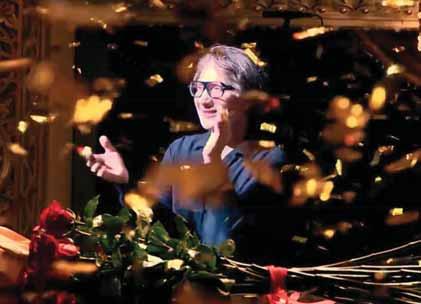

often associated with Handel. The tempo suggested internal balance rather than external motion.
Scarlatti’s Sonata in D minor, K.9 arrived with a metallic gleam. The articulation was percussive, the phrasing almost percussive in its self-awareness. Shiukashvili avoided Mediterranean heat; he offered clarity instead, as if testing how much tension a phrase could hold before it cracked. Scarlatti’s obsessive repetitions turned hypnotic under his hands, like minimalism long before minimalism existed.
The Sonata in C major, K.330 moved through its three movements with the fluency of a mathematician talking about pleasure. The first was a textbook in balance, the second a study in restraint, the third a controlled release of wit. Shiukashvili’s Mozart lives in a world where elegance has edge. The phrasing sliced
rather than caressed; the rubato existed only where logic allowed it.
The five mazurkas that followed felt like a detour into the subconscious. Each one sounded like a confession filtered through rhythm. The A minor piece drifted like smoke, its harmony searching for ground. The C major swayed with a drunken dignity. The D-flat major revealed an aristocratic sadness. The F minor had a subterranean pulse that kept the piece alive long after the final note. The B minor ended the set with a sense of beautiful exhaustion. Shiukashvili’s Chopin does not melt. It thinks. He shapes every phrase as if examining an emotion under laboratory light, finding its geometry, then releasing it back into air.
The concert closed with Mozart’s Piano Concerto No. 23 in A major, K. 488. Shiukashvili’s collaboration with the Opera Theater Orchestra turned the score into a field experiment in transparency. The piano lines emerged like threads of glass woven into the orchestral fabric. The Adagio had a suspended, oxygen-thin quality, while the final Allegro assai carried an unforced brightness that felt earned rather than decorative.
In a culture that still treats classical performance as ritual, Shiukashvili brings the mind of a designer. His playing is stripped of sentimentality, his repertoire curated like a thought experiment about continuity and time. At fifty, he plays as if still editing his own legacy.
The audience that night didn’t witness a retrospective. It witnessed a recalibration—a pianist dissecting the European canon to see what still breathes inside it. Georgia’s musical scene rarely produces figures who combine precision, risk, and institutional influence with such coherence. Shiukashvili’s recital offered a blueprint for that synthesis.
The Well of the World at GIFT: Teatro delle Albe’s
MADRE Digs into the Abyss of Our Technological Faith
REVIEW BY IVAN NECHAEV
The stage at the Tumanishvili Theater opens like a wound. Inside it, a well—bottomless, ancient, echoing— waits for the audience to fall in. MADRE, the latest work by Marco Martinelli and Ermanna Montanari of Teatro delle Albe, does not unfold as a play in the traditional sense. It breathes, groans, and meditates as a stage poem— a tragic psalm for a planet losing its own maternal voice. Presented at the GIFT Festival in Tbilisi, the performance becomes a strange form of modern ritual: a requiem for humanity’s addiction to progress.
Ermanna Montanari’s voice, half incantation, half erosion, sets the tone for this journey into the underworld. The mother, trapped in the well, speaks from a depth that feels geological. Her words carry the sediment of centuries, of myths that have crumbled into dust. She is both an individual and an element—a maternal Earth that has ceased to nurture and has begun to decay. Marco Martinelli frames this descent in language that oscillates between prophetic urgency and fablelike simplicity, echoing Dante and Pasolini in equal measure. The audience, seated in the semi-darkness, becomes a congregation listening to the Earth confess its exhaustion.
The son—an emblem of modern man, frantic and mechanized—tries to rescue her with the tools of civilization: pipes,
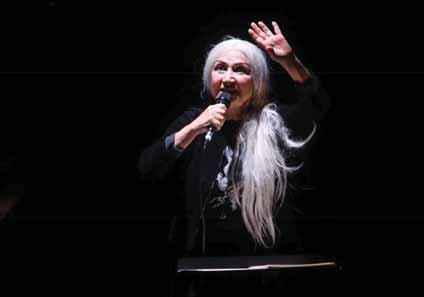
engines, tires, iron. Each object is an artifact of ingenuity and despair. The well grows deeper with every attempt, as if technology itself were widening the abyss it claims to bridge. Daniel Roccato’s sound design layers industrial rumble and subterranean resonance, transforming the theater into a metallic cathedral where faith has been replaced by the hum of machines. There is no salvation in MADRE. The mother’s serenity, her calm acceptance of the underground, is more unsettling than her fall. She does not plead for deliverance. She dissolves into the darkness with the composure of something that has understood the end as a natural state. Montanari performs her with a slow-burning gravity—her face a flickering landscape between agony and transcendence. Each pause in her speech is a chasm. Each exhalation feels like the final breath of an ecosystem.
Teatro delle Albe has spent four decades mapping the border between theater and myth, between political urgency and spiritual lament. Their MADRE belongs to this lineage, yet it feels like an epitaph to it. The work’s poetic density replaces narrative with resonance, inviting the spectator into an experience closer to a medieval mystery play than to a modern drama. Martinelli’s writing does not describe; it invokes. The text exists as a score of images—burned fields, drowned voices, rusted altars. In the Tumanishvili theater’s compact space, the production achieves the intimacy of an inner vision. Light and shadow behave as moral forces. Stefano Ricci’s visual design shapes the darkness into architecture; every glint of reflection feels like a signal from another realm.
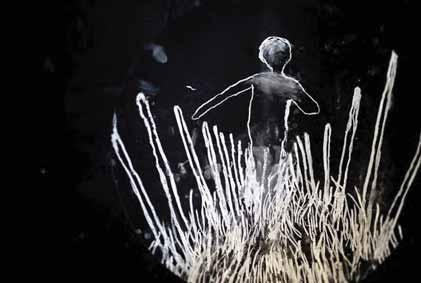
The stage becomes an x-ray of the human condition—its bones made of iron and its heart encased in asphalt.
The well, in this cosmology, is not only a place of descent but a mirror turned downward. It reflects our collective face: exhausted, luminous, and slightly terrified. MADRE does not accuse; it mourns.
The mourning, though, carries a strange dignity. There is a quiet beauty in watching a civilization confront its own reflection and recognize its resemblance to its dying mother.
At the end, silence becomes the final character. It lingers long after the lights fade, like the echo of an unanswered prayer. The audience remains seated, suspended between awe and unease.
The performance leaves them not with catharsis, but with the uneasy clarity of having stared into the well and seen how
much of the world is already at the bottom.
Teatro delle Albe’s MADRE is an act of philosophical theater in an era that rarely permits reflection. It speaks through images rather than slogans, through vibration rather than spectacle. In the context of the GIFT Festival—a space dedicated to cross-cultural artistic communion—it resonates as a reminder that the most radical gesture in art today might be contemplation itself. In Tbilisi, where histories of collapse and renewal coexist within every street, MADRE feels almost prophetic. It stages the collapse of illusion without despair, transforming apocalypse into awareness. In the theater’s dim well of light, humanity listens to its own voice fading into the earth. And for a moment, the echo sounds like prayer.
Photo source: Valerian Shiukashvili’s Facebook page
Photo source: Valerian Shiukashvili’s Facebook page
A scene from Madre. Source: Sophia Tortladze FB
An image from Madre. Source: Sophia Tortladze FB
Memory as a Stage: The Gabriadze Theater’s New Mediations on Humanity and Remembrance

BY IVAN NECHAEV
There are few cultural spaces in Tbilisi that feel so gently alive as the Gabriadze Theater — a place where puppets breathe, clocks sigh, and the city itself seems to listen. With the launch of its new bilingual and trilingual mediation program, the theater opens an invisible threshold: an encounter between art and reflection, between performance and collective introspection. Two new mediations — The Art of Staying Human led by Chika, and Machines of Time and Mechanisms of Memory curated by Misha — now accompany the theater’s repertoire in Georgian, English, and Russian, becoming part of its permanent program and online presence.
Both mediations carry the same quiet radicalism that defines the Gabriadze ethos. They transform the theater visit
into a process of thinking, feeling, and remembering. The gesture recalls the European model of artistic mediation that emerged within museums and contemporary performance institutions — yet here it finds a singular Georgian rhythm, woven from the tactile poetry of Gabriadze’s imagination.
The Art of Staying Human invites the visitor into a liminal space between spectacle and solitude. Actress and longtime collaborator Chika guides us into the intimate alcoves of the Theater. Her narration unfolds personal anecdotes of rehearsals and of mornings spent with the late founder, Rezo Gabriadze. Every puppet in that realm authorises a meditation on embodiment. Chika reveals how breath, movement and touch transform wood and fabric into characters imbued with gesture and memory. The venue becomes a terrain of anthropological inquiry: a theater of the human, where the human is refracted through the marionette’s suspended being. Chika’s narrative foregrounds the theater’s
ethic: art is a human practice, and its objects (puppets, clocks, miniature settings) demand as much care as performers themselves. The visitor becomes a witness to that care, and thereby a participant in it.
In his mediation Machines of Time and Mechanisms of Memory, actor Misha ushers us into the subterranean mechanics of the Theater’s machine-metaphor. The tour is structured in acts, each devoted to a dimension: childhood and memory; time as poetic medium; the hidden architecture of puppets; performance ritual and healing. Misha’s tone is confessional without being intimate in the conventional sense. He recounts his own memories, and from there extrapolates to a wider ontology of the haunted object. The Theater becomes a laboratory of time, where “machines breathe” and “stories carry the weight of memory.”
Here, the visitor is not simply guided, but invited into a topology of remembrance: the marionette’s joint, the clock’s hinge, the thread pulley—each becomes a site of recollection. Memory, in Misha’s framing, is not romantic, but structural. One learns how the Theater itself acts as an archive, how matter holds events.
One hears the hint of psychoanalytic echo: the puppet’s stillness and the mechanism’s silence contain the shadow of what has happened, what is withheld, what persists.
These two mediation formats indicate the Gabriadze Theater’s evolution from a singular auteur-space (Rezo Gabriadze’s domain) into a reflexive cultural institution. The move signals a discursive turn: the theater invites not only spectatorship of performances but sitespecific reflection on production, memory, materiality and human being. The trilingual offering breaks the monolingual mould of many Georgian cultural institutions, and thus acknowledges the multiplicity of audiences and heritages in Tbilisi’s globalizing present. These mediations stage the primacy of process over product. We are oriented away from the theatrical event as climax, and toward the theater as apparatus of being.
The human remains, in Chika’s title, “the art” to be sustained; memory remains, in Misha’s axes, the construct to be attended. In both programmes the theater functions as a machine of experience, but one whose gears are wound by humility and attentiveness, rather than spectacle alone.
The Gabriadze Theater’s decision to institutionalize mediation marks a decisive step for Georgian cultural life. It signals a maturity of approach — one that treats heritage as a process of renewal and art as a tool of consciousness. Mediation here is not interpretation. The mediators are not guides but co-authors in an ongoing conversation between the audience and the theater’s spirit. In this sense, the project aligns with a broader movement across contemporary art institutions, from documenta’s discursive programs to the reflective practices of theaters like Rimini Protokoll or the Théâtre Vidy-Lausanne. Yet the Gabriadze version has an entirely different pulse. It carries the city’s melancholic humour, its post-Soviet texture, its faith in small gestures.
To attend these mediations is to enter a philosophical theater without actors, where the performance happens within the mind of the listener. It is an experiment in cultural time — an invitation to think with tenderness. The Gabriadze Theater once taught the world how puppets can feel more human than people; now it teaches how memory itself can perform, how humanity can be curated as an art form.

‘We Are Seekers’ Opens at TBC Concept Gallery
BY MARIAM RAZMADZE
TBC Concept Gallery presents ‘We Are Seekers’, a collaborative exhibition by Georgian photographer and filmmaker David Meskhi and Berlin-based American artist Tony Just, curated by LC Queisser. The exhibition opens on 14 November from 18:00 to 20:00 at the gallery’s Marjanishvili 7 location and will be on view Monday to Saturday from 10:00 to 20:00. The show unites two artists whose practices explore perception, memory and transformation through distinct yet complementary visual languages.
“A seeker is someone who is searching
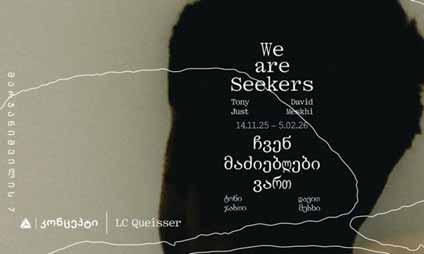
COMMERCIAL DEPARTMENT
Commercial Director: Iva Merabishvili
Marketing Manager: Natalia Chikvaidze
EDITORIAL DEPARTMENT:
Editor-In-Chief: Katie Ruth Davies
Journalists: Ana Dumbadze
Vazha Tavberidze
Tony Hanmer
Nugzar B. Ruhadze
Ivan Nechaev
Mariam Razmadze
Layout: Misha Mchedlishvili
Photographer: Aleksei Serov
and looking. This exhibition provided a context for me to reexamine how I make images. I came to this work seeking change. I was not after a single image but a selection of pictures from several bodies of work which create an atmosphere of uncertainty. Athletes removed from the mat, stripped of their original meaning and environment. These images are manipulated physically and digitally. It feels as though I’m moving through shadows towards something which is not yet fully seen, where both presence and absence can co-exist,” David Meskhi stated. Tony Just has lived and worked in Berlin for the past 17 years. His work has been exhibited internationally, including in Tbilisi, where he participated in the Propaganda residency in 2021–2022 and taught at the VA(A)DS at the Free Uni-
International Relations & Communications
Sofia Bochoidze E: sbochoidze@georgiatoday.ge
Website Editor: Katie Ruth Davies
Webmaster: Sergey Gevenov
Circulation Managers: David Kerdikashvili
David Djandjgava
ADDRESS
22 Janashia Str.
Tbilisi, 0179, Georgia
versity of Tbilisi. During that time, he presented a mural and artist books exhibition at Kona Books, curated by Nina Akhvlediani, and was part of the group show ‘Sanctuary’ at LC Queisser. David Meskhi, born in 1979 in Tbilisi, studied photography and cinema at the Shota Rustaveli Theatre and Film University. Growing up in a sports environment, with his father serving as a gymnastics coach for the national Soviet team, Meskhi often draws from physical movement and the body in his imagery. In 2015, he co-directed the award-winning documentary ‘When the Earth Seems to Be Light’, a portrait of Georgia’s disenchanted youth. In 2024, the Musée d’art Moderne et Contemporain de SaintÉtienne Métropole (MAMC+) hosted his first solo museum exhibition in France.
Tel.: +995 32 229 59 19 E: info@georgiatoday.ge F: GeorgiaToday
ADVERTISING & SUBSCRIPTION
+995 577 72 52 61
E-mail: marketing@georgiatoday.ge
Reproducing material, photos and advertisements without prior editorial permission is strictly forbidden. The author is responsible for all material. Rights of authors are preserved. The newspaper is registered in Mtatsminda district court.
Reg. # 06/4-309
Photo: TBC Concept.
Tour of the Gabriadze Theater. Source: gabriadze.com
Tour of the Gabriadze Theater. Source: gabriadze.com

